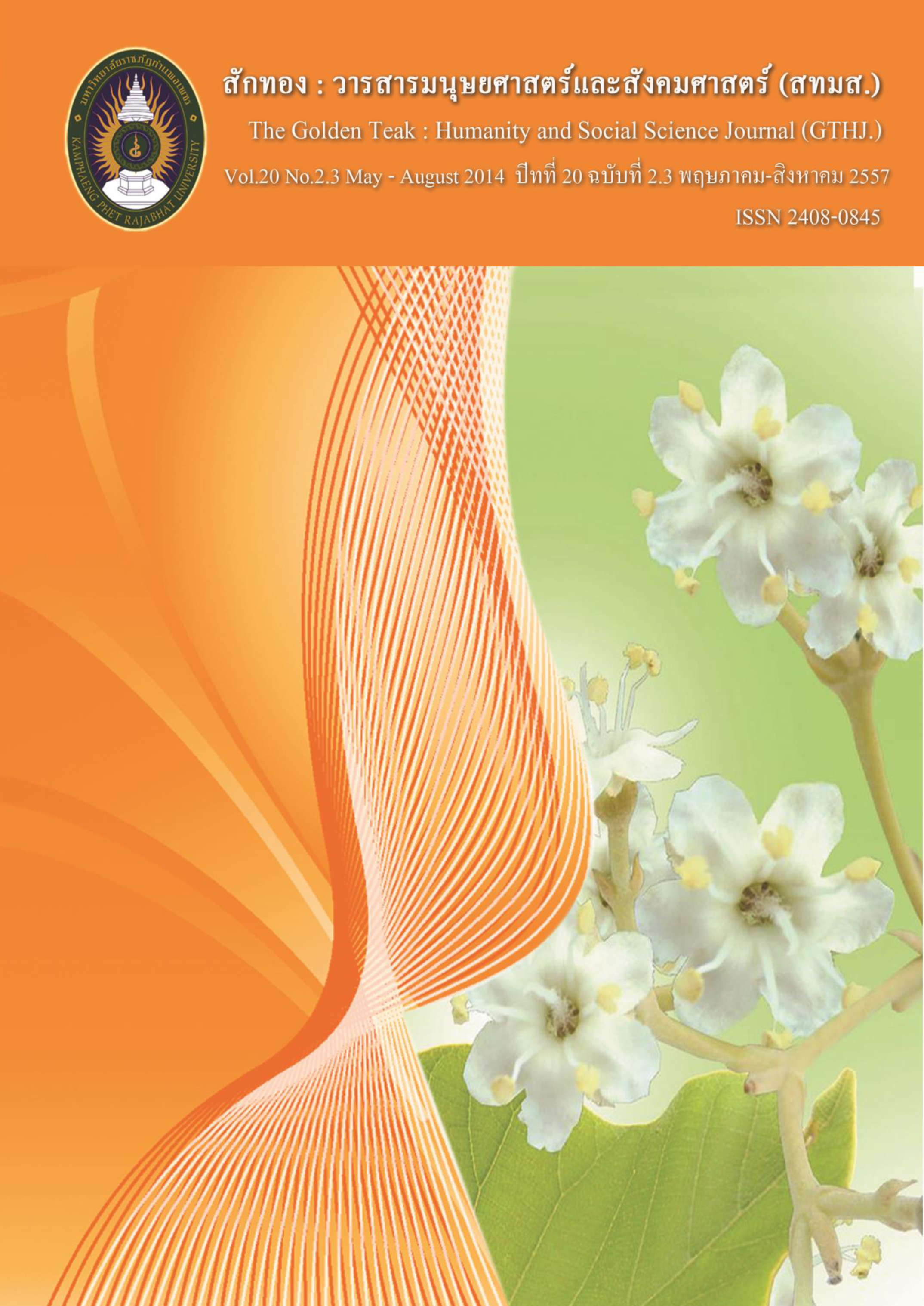Causal Model of Factors Affecting Organizational Climate as
Main Article Content
Abstract
ABSTRACT
The purposes of research were to investigate the causal model of factors affecting organizational climate as perceived by teacher of secondary schools under the Office of Basic Education Commission, by which the organizational climate was applied from Stringer (2002). The sample, derived by means of simple random sampling, consisted of 800 teachers of 100 secondary schools, in the academic year of 2013. There were six latent variables namely, school climate, performance, perception, motivation, environment and leadership. The research instruments were six questionnaires asking about the latent variables. The statistical devices used in this research were descriptive statistics used SPSS and was used AMOS to develop and validate the causal relationship model. Results indicated that the causal model of factors affecting school climate was congruence with the empirical data at good level. Goodness of fit measures were founds to be: X2 = 1252.038, df = 33, p = .000, CFI = .900, NFI = .898, IFI = .901 GFI = .796, and RMSEA = .218, The variables in hypothesis model explained school climate up to 98%. Variables which were statistically significant direct effect to school climate were: 1) perception 2) environment 3) performance 4) motivation and 5) leadership. Variables which were statistically significant indirect effect on school climate were: 1) Leadership indirectly affected through motivation; 2) Motivation indirectly affected through perception. The research also found the organization climate of large sized school was better than small sized school.
Article Details
บทความที่ได้รับการตีพิมพ์เป็นลิขสิทธิ์ของวารสาร สักทอง : วารสารมนุษยศาสตร์และสังคมศาสตร์ สถาบันวิจัยและพัฒนา มหาวิทยาลับราชภัฏกำแพงเพชร
ข้อคิดเห็นใดๆ ที่ปรากฎในวารสารเป็นวรรณกรรมของผู้เขียนโดยเฉพาะ ซึ่งมหาวิทยาลัยราชภัฏกำแพงเพชรและบรรณาธิการไม่จำเป็นต้องเห็นด้วย
References
วิทยาลัยการอาชีพและสารพัดช่างในกลุ่มภาคกลาง สังกัดกรมอาชีวศึกษา. วิทยานิพนธ์
ครุศาสตรมหาบัณฑิต สถาบันราชภัฏนครปฐม.
คณะกรรมการการศึกษาแห่งชาติ, สำนักงาน. (2545). แผนการศึกษาแห่งชาติ (2545-2559). กรุงเทพฯ:
พริกหวานกราฟฟิค.
เทพพนม เมืองแมน และสวิง สุวรรณ. (2540). พฤติกรรมองค์การ. (พิมพ์ครั้งที่ 2). กรุงเทพฯ:
ไทยวัฒนาพานิช.
ธร สุนทรายุทธ. (2551). การบริหารจัดการเชิงปฏิรูป: ทฤษฎี วิจัย และปฏิบัติทางการศึกษา.
(พิมพ์ครั้งที่ 1). กรุงเทพฯ: เนติกุลการพิมพ์.
นงลักษณ์ วิรัชชัย. (2542). โมเดลลิสเรล : สถิติวิเคราะห์สำหรับการวิจัย (พิมพ์ครั้งที่ 3).
กรุงเทพฯ: จุฬาลงกรณ์มหาวิทยาลัย.
ปิยะ ทรัพย์สมบูรณ์. (2545). ความสัมพันธ์ระหว่างบรรยากาศองค์การกับประสิทธิผลของ
โรงเรียนมัธยมศึกษา สังกัดกรมสามัญศึกษา เขตการศึกษา 1. วิทยานิพนธ์
(บริหารการศึกษา) บัณฑิตวิทยาลัย มหาวิทยาลัยศิลปกร.
ภารดี อนันต์นาวี .(2552). หลักการแนวคิด ทฤษฎีทางการบริหารการศึกษา. ชลบุรี: มนตรี.
เลขาธิการสภาการศึกษา, สำนักงาน. (2545). รายงานสภาวะการศึกษาไทยต่อประชาชน:ปมปฏิรูป. กรุงเทพฯ: พิมพ์ดี.
เลขาธิการสภาการศึกษา, สำนักงาน. (2548). สภาวะการขาดแคลนครูในระดับการศึกษาขั้นพื้นฐานของ
ประเทศไทย. กรุงเทพฯ: พริกหวานกราฟฟิค.
ศิริลักษณ์ ถิตย์รัศมี. (2556). ได้ศึกษาความสัมพันธ์ระหว่างบรรยากาศองค์การกับประสิทธิภาพการ
ปฏิบัติงานของบุคลากร วิทยาลัยการเมืองการปกครอง มหาวิทยาลัยสารคาม. วิทยานิพนธ์ บัณฑิตวิทยาลัย มหาวิทยาลัยมหาสารคาม.
ศึกษาธิการ, กระทรวง. (2550). รายงานการศึกษาไทยในเวทีโลก พ.ศ.2549. (พิมพ์ครั้งที่ 1). กรุงเทพฯ:
จุฬาลงกรณ์มหาวิทยาลัย.
สมพิศ เก่งพานิช. (2549). ความคาดหวังในการสร้างบรรยากาศองค์การที่เอื้อต่อการจัดการเรียนรู้ของ
ข้าราชการครูโรงเรียนวัดแจงร้อน สำนักงานเขตราษฎร์บูรณะกรุงเทพมหานคร. วิทยานิพนธ์
(การบริหารการศึกษา) บัณฑิตวิทยาลัย มหาวิทยาลัยราชภัฏพระนคร.
สัมฤทธิ์ ยศสมบัติ. (2548). รัฐประศาสนศาสตร์แนวคิดและทฤษฎี. กรุงเทพฯ: เอ็กเปอร์เน็ท.
สายพิณ สายดำ. (2552). บรรยากาศองค์การที่มีผลต่อความยึดมั่นผูกพันต่อองค์การของเภสัชกร
โรงพยาบาลศูนย์ในภาคตะวันออกเฉียงเหนือ. วิทยานิพนธ์ปรัชญาดุษฎีบัณฑิต
บัณฑิตวิทยาลัย มหาวิทยาลัยขอนแก่น.
สุพิศ ประสพศิลป์. (2540). การวิเคราะห์ปัจจัยที่ส่งผลต่อบรรยากาศองค์การของสถาบันการศึกษา พยาบาล.ปริญญานิพนธ์ ค.ด. (บริหารการศึกษา). กรุงเทพฯ: จุฬาลงกรณ์มหาวิทยาลัย.
อมรวิชช์ นาครทรรพ. (2549). “ทีชเชอร์วอทช์” โชว์ข้อมูลเบื้องต้นครูไทย. วันที่สืบค้น 9 ธันวาคม 2556.
เข้าถึงได้จาก http://www.vcharkarn.com/vcafe/60244.
Bass, B. M. (1985). Leadership and performance beyond expectation. New York:Free Press.
Davis, K. (1981). Human behavior at work. New York: McGraw – Hill.
Dubrin, A. J. (1973). Fundamentals of organizational Behavior. New York: Pergamon Press.
Hoy, W. K. & Miskel, C. (2001). Educational Administration Theory Research and Practice.
(6 th ed.) New York: McGraw – Hill.
James, L. R. & A. P., Jones. (1988). Organizational Climate: A Review of Theory and Research. Psychological Bullentin.
Kundo, K. (2007). Development of the Conceptual Framework of Organizational Climate.
Vidyasagar University, Journal of Commerce.
Likert, R. (1967). The Human Organization: Its Management and Value.
New Yourk: McGraw – Hill.
Munson, R. C. (2002). Teacher Motivation Deprivation : Individual and Institutional Response. [online], Accessed 8 June 2014. Available from http:/.wwwlib.umi.com/dissertations/.
Parcel, G. S., et. al. (2003). “School Climate and the Institutionalization of the CATTCH
Program.” Health Education & Bevavior.
Pashiardis, G. (2008). “School Climate in Elementary and Secondary Schools: Views of
Cypriot Principals and Teachers.” The International Journal of Educational
Management.
Porter, L.W. & R.M. Steers. (1973). Organizational Work and Personal Factors in
Employee Turnover and Absenteeism. 80 (September 1973).
Schneider, B. & J., Bartlett. (1990). “Individual Differences and Organizational Climate I:
The Research Plan and Questionnaire Development.” Personnel Psychology.
Stringer. R. (2002). Leadership and organization climate. New Jersey: McGraw – Hill.
Sullivan, G. S. (1998). A Study of Teacher Motivation as It Relates to Age, Experience, Tenure, Level Taught, and Gender in the Elementary, Middle, and High School Levels. [Online], Accessed 8 June 2014. Available : http://www.lib.umi.com/
Weber, M. (1947). The Theory of Social and Economic Organizations. Translated by A.M. Handerson and T. Parsons. New York : Free Press.
Zulling, K. J., et al. (2010). School Climate : Historical Review, Instrument Development, and
School Assessment. Journal of Psychology Educational Assessm


